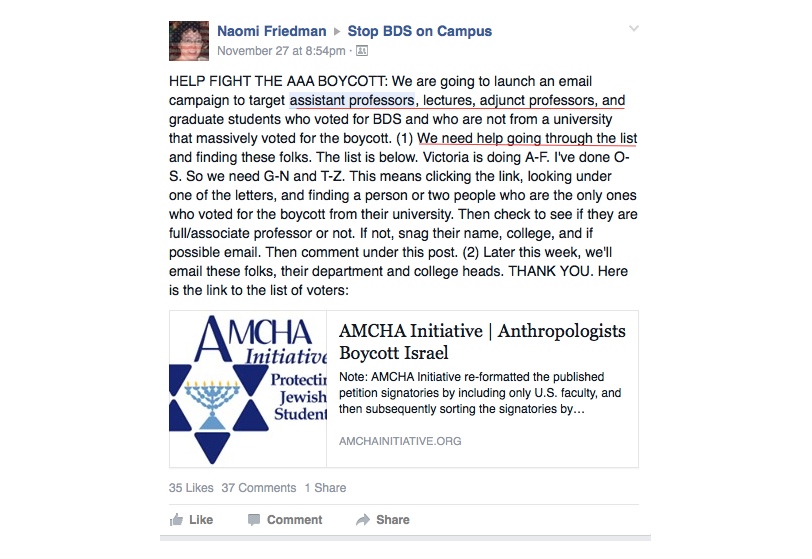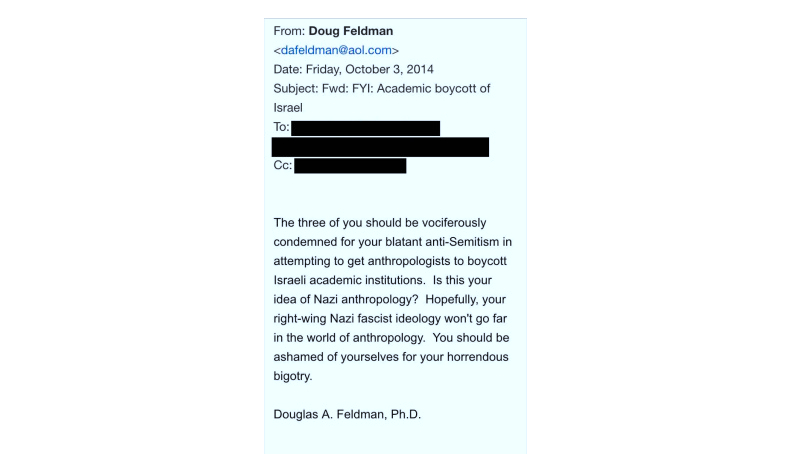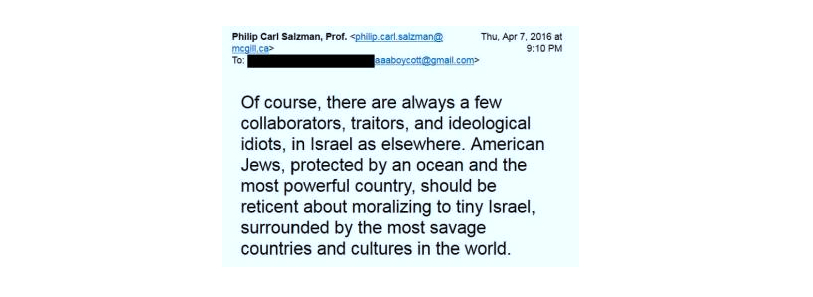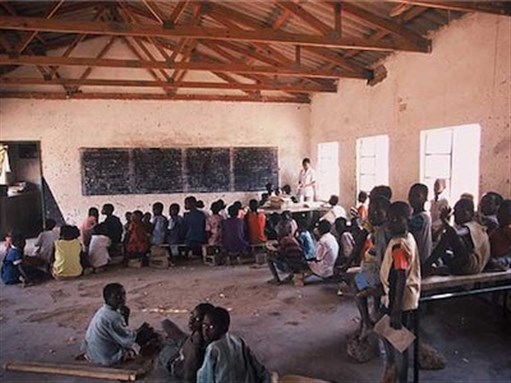[This piece was first posted on the website of Anthropologists for the Boycott of Israeli Academic Institutions on 28 April 2016.]
As members of the American Anthropological Association (AAA) cast their ballots on a proposed boycott of Israeli academic institutions, outside organizations are desperately mobilizing to pressure the Association and derail the initiative.
In the interests of educating all members of the Association—whatever their position on the boycott—we are sharing information about these attempts to interfere in the AAA’s democratic processes. We believe sunlight is the best disinfectant, and that an informed membership can better stand together against such pressures.
In November, the boycott passed a preliminary vote by an overwhelming 88% with unprecedented turnout at the AAA annual meeting in Denver. The final vote, which is open to all members, is being conducted by e-ballot until May 31. If the proposed resolution passes, the 10,000-strong AAA will be the largest US-based scholarly body to endorse the boycott.
For the past three years, Anthropologists for the Boycott of Israeli Academic Institutions has worked to educate and mobilize our colleagues in the AAA and beyond about the boycott. This process has sparked far-reaching and often thoughtful debates from many different perspectives. We have published dozens of articles, including some by reluctant supporters of the boycott, intended to address a variety of concerns.
But as we have moved closer to this historic vote over the past year, outside groups have sought to intimidate, confuse, and distract the Association and its members.
- A new organization calling itself the Academic Engagement Network (AEN) openly boasts about its efforts to defeat the AAA boycott resolution. Much of the group’s initial $2 million budget comes from the Schusterman Family Foundation, which has also paid AAA membership fees for graduate students to attend conferences and work against the boycott.
- AMEINU, another pro-Israel organization, provides fundraising support to Anthropologists for Dialogue on Israel/Palestine (ADIP). The “donate” button on ADIP’s website leads directly to the AMEINU website, and ADIP’s emails list AMEINU’s New York office as a mailing address.
This interference is unacceptable and should be rejected, especially by colleagues who claim to oppose the boycott on grounds of academic freedom. Anthropologists for the Boycott of Israeli Academic Institutions—which is composed solely of AAA members and is entirely self-funded—calls on outside groups to cease all efforts to pressure members of the Association.
In addition to funding and assisting anti-boycott initiatives within the AAA, outside groups are using strong-arm tactics directly against the Association and individual anthropologists, including the following:
Targeted harassment campaigns. Last December, anti-boycott pressure groups issued calls on Facebook to target untenured and adjunct boycott supporters by organizing email campaigns to pressure their deans and administrators. These efforts are facilitated by right-wing organizations such as the AMCHA Initiative, which has been publicly criticized on numerous occasions by the Middle East Studies Association’s Committee on Academic Freedom for its attempts to punish scholars it identifies as critics of Israel. AMCHA Initiative created an institution-by-institution blacklist of anthropology boycott supporters, which boycott opponents then used to crowd-source their harassment campaigns. Here’s what the appeals looked like on Facebook:

Fortunately, these campaigns appear to have had limited effect, often because the people writing had no connection to the institutions in question.
Lobbying university administrators. The Association of University Heads in Israel has been lobbying university administrators in the US to publicly oppose the boycott. Last week, University of California president Janet Napolitano and the chancellors of all ten UC campuses signed a public letter demanding that the AAA (which it twice mistakenly called the “American Association of Anthropologists”) not endorse the boycott. The letter is more than a blatant attempt to interfere with the Association’s democratic processes—it is also part of a disturbing pattern of high-handed decision-making within the UC system itself, and has sparked fierce criticisms from UC faculty members. These administrators claimed to speak on behalf of the whole UC system, even as numerous faculty members and student bodies have endorsed the boycott. This is a reminder that #anthroboycott is not only an act of solidarity with Palestinians, but is linked to the struggle for fairer and more democratic institutions of higher education around the world.
Threats of frivolous litigation. Just after the opening of the AAA boycott vote, pro-Israel groups filed a lawsuit against the American Studies Association (ASA), seeking to overturn its 2013 decision to endorse the boycott of Israeli academic institutions. The timing of the lawsuit strongly suggests it is meant to intimidate the AAA. The litigants’ case rests on the dubious legal theory that disgruntled members of a private academic association can ask the courts to overturn the results of any democratic membership vote. The idea for the lawsuit was first publicly floated by Eugene Kontorovich, a Northwestern University law professor who is also an Israeli settler with a home in a Jewish-only colony in the West Bank. Kontorovich serves as an adviser to the plaintiffs’ legal team. While clearly meritless, the lawsuit’s true goal is to frighten other academic associations. Even other boycott opponents have slammed the lawsuit as “a demand by conservatives for government suppression of a private organization’s freedom of speech, and it is nothing but unprincipled, absolutely indefensible hypocrisy.”
Legislative grandstanding. Over the past few years, several state legislatures have considered bills ostensibly aimed at fighting boycotts involving Israel. Many of these proposals blatantly violate constitutional rights to free expression and association. Only a few have passed, and those that have were watered down to the point where they would have no impact on a non-profit academic association such as the AAA.
Hate mail. Uncritical supporters of Israel have sent much racist hate mail against the boycott to public boycott supporters and AAA leaders. Similar hate email was sent to the ASA leadership after that association endorsed the boycott in 2013. More disappointing is that fellow anthropologists are not always above such behavior. Douglas Feldman, professor of anthropology at SUNY Brockport and former president of the Society for Medical Anthropology, emailed members of the campaign, accusing them of “Nazi fascist ideology.” Philip Salzman, a professor of anthropology at McGill University, sent the campaign a message describing Israel as “surrounded by the most savage countries and cultures in the world” [both emails are reproduced below]. As detailed by Lisa Rofel and Dan Segal, these unfortunate and racist attacks from fellow anthropologists debase the debate over the boycott.


![[Logo of Anthropologists for the Boycott of Israeli Academic Institutions]](https://kms.jadaliyya.com/Images/357x383xo/AAA_Logo.jpg)
















